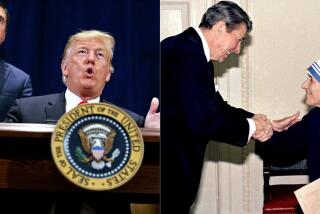Immobility’s Voice
- Share via
The address by President Reagan on the problems of South Africa neither charted a new course nor made more comprehensible his policy of the past. Rather, it was a defense essentially of his six years of immobility. That may satisfy President Pieter W. Botha, and the radical right in the United States, but it will surely frustrate the majority in South Africa that had hoped for an aggressive American role. And, in converting the conflict over political and economic justice in Southern Africa into an East-West confrontation, just as he has chosen to do in Central America, Reagan made the efforts of those seeking genuine reform more difficult.
There will be no argument with Reagan’s insistence that only South Africans can solve their problems. The issue has been how to permit South Africans, notably the black majority, to have a voice in that process. Reagan has suggested the freeing of Nelson Mandela, and all political prisoners, without clarifying the conditions. Even Botha favors freeing Mandela, although conditionally. Reagan called for dialogue to construct “a political system that rests upon the consent of the governed,” arguing that this new system must provide the protection of the law for “the rights of majorities, minorities and individuals”--ideals that no state has fully achieved. He appealed to blacks to renounce retribution as they look to the future, but he never said what price the white minority will need to pay.
Once again Reagan has been absolute in his opposition to sanctions. And worse. He called for coordination with the allies, then associated himself with the one and only ally that opposes sanctions, Great Britain. His stand, like that of Prime Minister Margaret Thatcher, is wrong because it assumes that the options are all or nothing, and in doing nothing both governments have encouraged complacency in Pretoria.
Most disappointing of all, however, was the President’s ideological excursion into the Cold War. He portrayed as a war for “black liberation” his alliance with South Africa in the war in Angola on the side of the Unita guerrillas, but he rejected as Soviet-sponsored communist intervention the armed struggle of the African National Congress guerrillas in South Africa. He raised the specter of Soviet exploitation of sea lanes around South Africa and Southern Africa’s strategic minerals if hostility rises, when most people in the region would argue that it is the President’s policy of constructive engagement that has raised the risks of anarchy.
His words were obviously intended to discourage Congress from further action on mandatory sanctions. He had intended to dramatize his good intentions by naming a black ambassador to represent the United States in Pretoria--a gesture in itself that measures the shallowness of policy thinking in the U.S. government at this time. His words leave little choice. The House of Representatives, in a moment of excessive emotionalism, has adopted extreme measures that would do more harm than good. But from this the Senate now can draw a program of moderated, constructive action that will erase, in the minds of the white oligarchy in South Africa, the doubts that Reagan has surely left about the determination of the United States to stand with the majority in South Africa.
More to Read
Sign up for Essential California
The most important California stories and recommendations in your inbox every morning.
You may occasionally receive promotional content from the Los Angeles Times.













